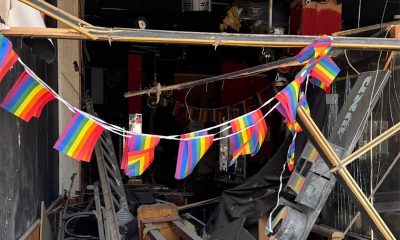World
Out in the World: LGBTQ news from Europe and Asia
Sept. 16 marked a year since Mahsa Amini’s death in Iran

Iran
Shadi Amin, the executive director of Germany-based Iranian LGBTQ network 6rang (Iranian Lesbian and Transgender Network), grew up in Iran thinking she was “sick” because she’s queer. In a recent interview with PinkNewsUK, Amin reflected on the death of 22-year-old Mahsa Amini for allegedly not wearing a headscarf properly by Iran’s dreaded “morality police.”
The death of the young Iranian Kurdish woman on Sept. 16, 2022, touched off massive protests across the country, especially in its capital city of Tehran. But Amin points out that those protests over Amini’s death led to become a rally call to fight for the rights of women, LGBTQ folks and other marginalized groups in Iran.
“[LGBTQ+ people] are one of the most active and involved groups in these demonstrations and protests last year … We saw everywhere when there was a demonstration [there was] the rainbow flag, even if sometimes the people didn’t agree with that and they said go back,” Amin told PinkNewsUK.
“They tried to put us out of the demonstration, but I think our LGBTI youth community is really powerful and they try to bring their demands in this movement,” she added.
More than 22,000 people were arrested and hundreds killed, including some who were executed by the Iranian government in an effort to crush dissent through violence.
Read the entire interview here: [Link]
Serbia
Earlier this month several hundred LGBTQ people and the allies marched in the Serbian capital of Belgrade marking the celebration of a Pride march that was unmarred by violence in this religious conservative Balkan nation.
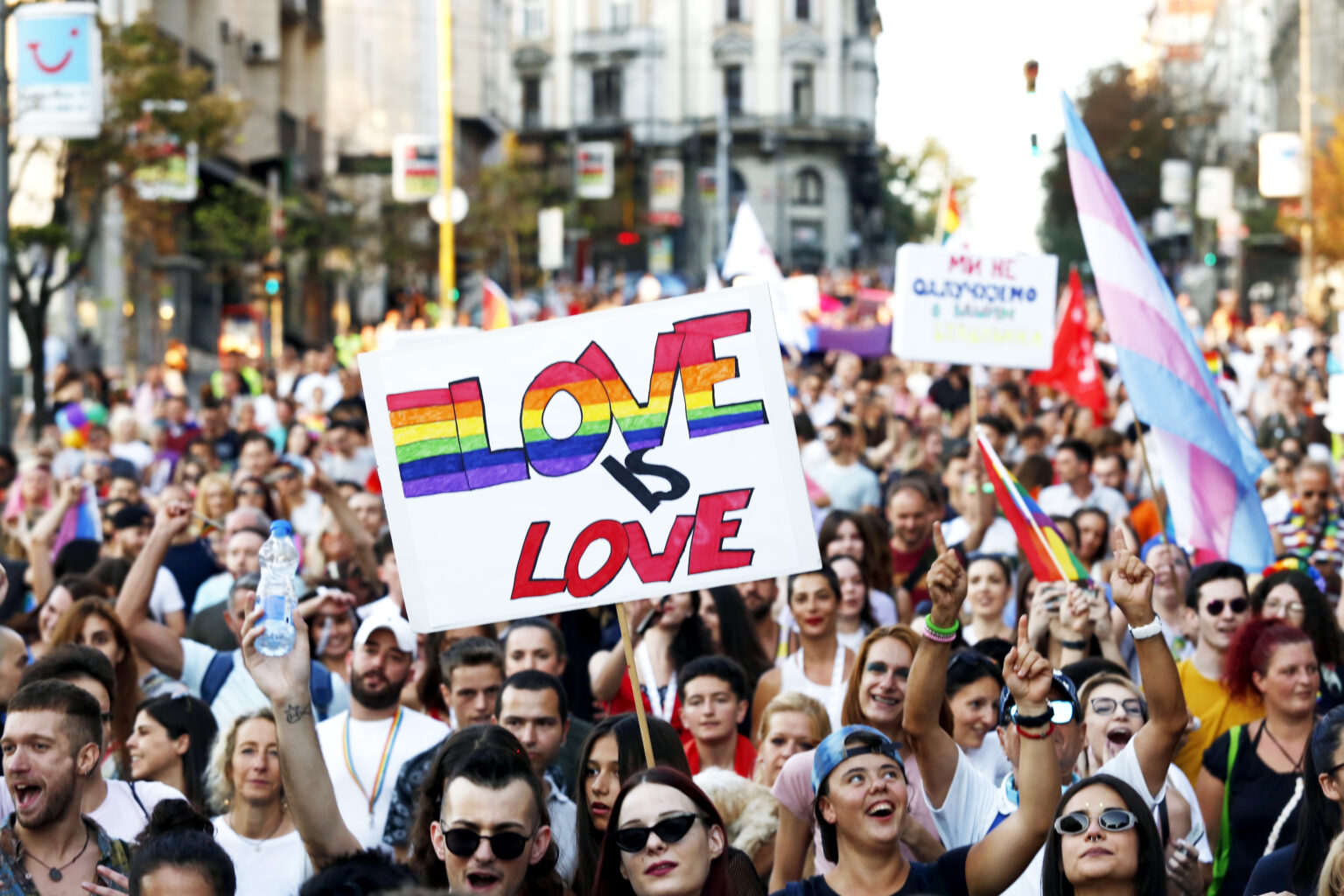
Radio Free Europe noted that in a similar event last year, at least 21 people were arrested in connection with attacks against police, with most of them suspected of being far-right hooligans protesting against the LGBTQ Pride march.
The government of Serbian President Aleksandar Vucic reversed its decision to ban the international EuroPride parade event on Thursday, Serbian state media reported.
On Sept. 12, officials from EuroPride and Belgrade Pride, commemorated the start of EuroPride 2022 in Belgrade with a ceremonial flag raising. On Friday led by the Dutch Embassy, members of the European Union and other non-EU states issued a joint statement applauding the Serbian government’s roll-back of the ban.
United Kingdom

A 29-year-old man was arrested by Greater Manchester Police in connection with the vandalistic attacks on the Clonezone store on Sackville Street in the heart of Manchester Center. The store is the U.K.’s first and favorite Queer Superstore.
The suspect also being held on suspicion of 24 motor vehicle thefts and remains in custody for questioning.
Clonezone has been attacked five times this year, with the latest incident on Sept. 10 at approximately 2 p.m. Two men approached the shop on a bike on Sunday and attempted to smash the windows before throwing an object at the doors.
Chief Inspector Steve Wiggins, of GMP’s City Center Neighborhood Team, said: “This is the second arrest in connection with this series of disturbing incidents but the investigation is still very much ongoing.
The attacks are very specific with offenders arriving on bikes and causing significant damage.
We are keen to find out the motivations behind the attacks and believe that will help us trace those responsible and bring them to justice.
We have a dedicated team investigating these incidents, so if anybody knows anything about these attacks I would urge them to call police.”
Information can be passed on to police by calling 0161 856 3345 or via 101, or anonymously through Crimestoppers at 0800 555 111.
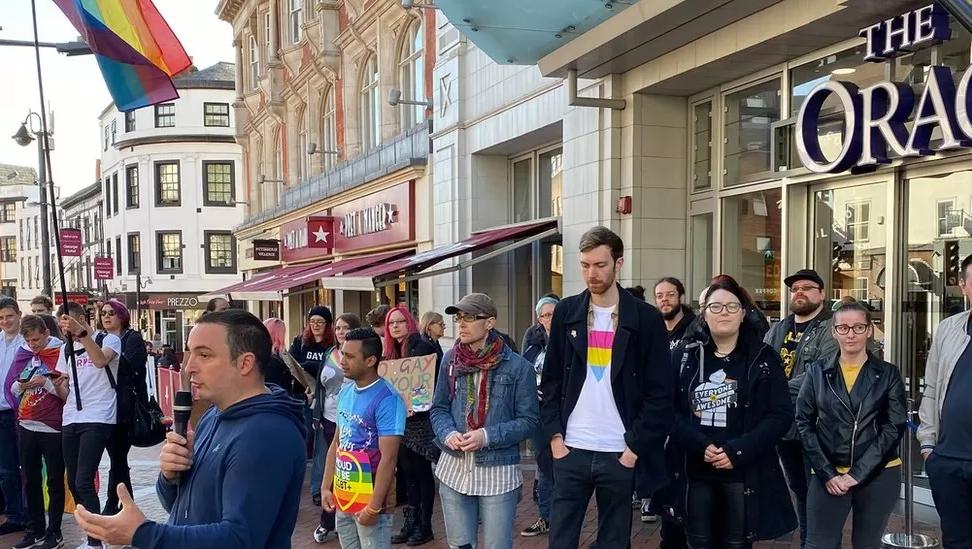
American fast food chain Chick-Fil-A announced its plans to open five new franchise stores around Britain in as yet to be disclosed locations, the BBC reported on Sept. 15.
Chick-fil-A had previously launched a pop-up store for a six month lease in the Oracle shopping center in Reading in 2019, but was met with severe opposition and its lease wasn’t renewed. British LGBTQ rights activists protested the College Park, Ga.,-based food chain’s donations to groups that have a record of being opposed to LGBTQ rights.
During the 2019 protests in Reading, the BBC noted that Reading Pride spokesperson Kirsten Bayes told protesters: “Companies like this have no place here in Reading and they have no place anywhere.
“We are standing in solidarity with campaigners across the United States … for justice and freedom for LGBT people.”
A local elected official, Reading Labor Councilor Sarah Hacker said: “We can make sure that they don’t spread their hatred across the U.K.”
The fast food chain firm is run by the Cathy family, who have publicly stated their opposition to same-sex marriage and other LGBTQ issues. In 2020, the firm softened its stance and shifted its focus, hiring a diversity vice president. The BBC reported that the company changed its approach to charitable giving, focusing on education and hunger alleviation, moving away from donations directed at anti-LGBTQ organizations, including several of those listed as extremist hate groups by the Southern Poverty Law Center.
“From our earliest days, we’ve worked to positively influence the places we call home and this will be the same for our stores in the U.K.,” Joanna Symonds, Chick-Fil-A’s head of U.K. operations, told the BBC.
“We encourage our operators to partner with organizations which support and positively impact their local communities, delivering great food and wider benefits to those around them,” she added.
In announcing the new U.K. investment, the chain highlighted its current charitable work, which include a $25,000 one-off donation to a local non-profit organization when a Chick-fil-A restaurant is opened, and donations of surplus food to local shelters, soup kitchens and food charities. Those policies would apply to its U.K. branches too, it said.
Ireland
The apparent rebranding of a beloved LGBTQ bar and safe space in Cork and makeover provoked protests by the local queer community.
Irish LGBTQ publication GCN reported that in recent weeks, people began to notice a change in the appearance of Chambers Bar, no longer recognizable as an LGBTQ space. A new sign had been displayed above the doorway with the name “Sinners” in black and white, a stark contrast to the venue’s once vibrant appearance.
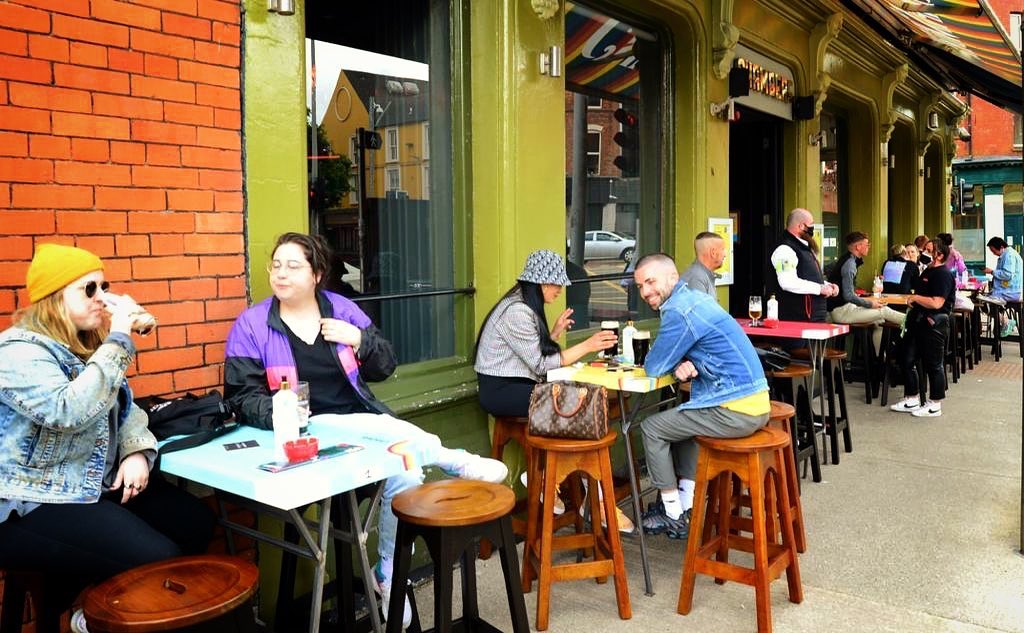
This name is nothing new to people in Cork, as Chambers Bar has been hosting student nights under this name for a number of years. Even so, this year was the first time that, in addition to hosting a student night for “Freshers” Week, all Pride flags, rainbow curtains and posters for upcoming drag shows were also taken down.
However, the catalyst for sparking an onslaught of backlash seems to have come from the cancellation of a weekly drag show. This was to be hosted by Cork drag queen Krystal Queer, who took to Instagram to express her disappointment in a video that now has over 300,000 views.
In stark contrast to the small group of anti-transgender protesters gathered in Dublin to hear anti-LGBTQ TERF Kellie-Jay Keen, a.k.a. Posie Parker, speak at her “Let Women Speak Rally” at Merrion Square, Trans and Intersex Pride Dublin had nearly a thousand supporters turn out to counter demonstrate.
The Irish Times reported that a large police presence was visible in and around the square and metal barriers were erected to create a space between the rival demonstrations.
The counter demo by Trans and Intersex Pride Dublin assembled outside the lower house of the Irish legislature on Kildare Street ahead of marching into Merrion Square.
Leading pro-trans activist Jenny Maguire told the crowd: “We as queer people are forced into a world that’s not meant for us.”
“We do everything we can to force a world that accepts us and that can love us all unapologetically, and it is them that wants to reverse any progress we’ve made so far and pull us back into the Dark Ages.”
Italy
Italy’s right-wing Prime Minister Giorgia Meloni has demanded local councils only list biological parents on birth certificates, flinging hundreds of same-sex couples into a legal morass, France 24 News reported Thursday.
Journalist Lara Bullens reported that after same-sex civil unions were legalised in Italy in 2016, and in the absence of any clear legislation on parental rights for same-sex couples, a handful of city councils across the country started listing parents of the same gender on their children’s birth certificate.
This led to a situation of creating a host of “ghost parents.”
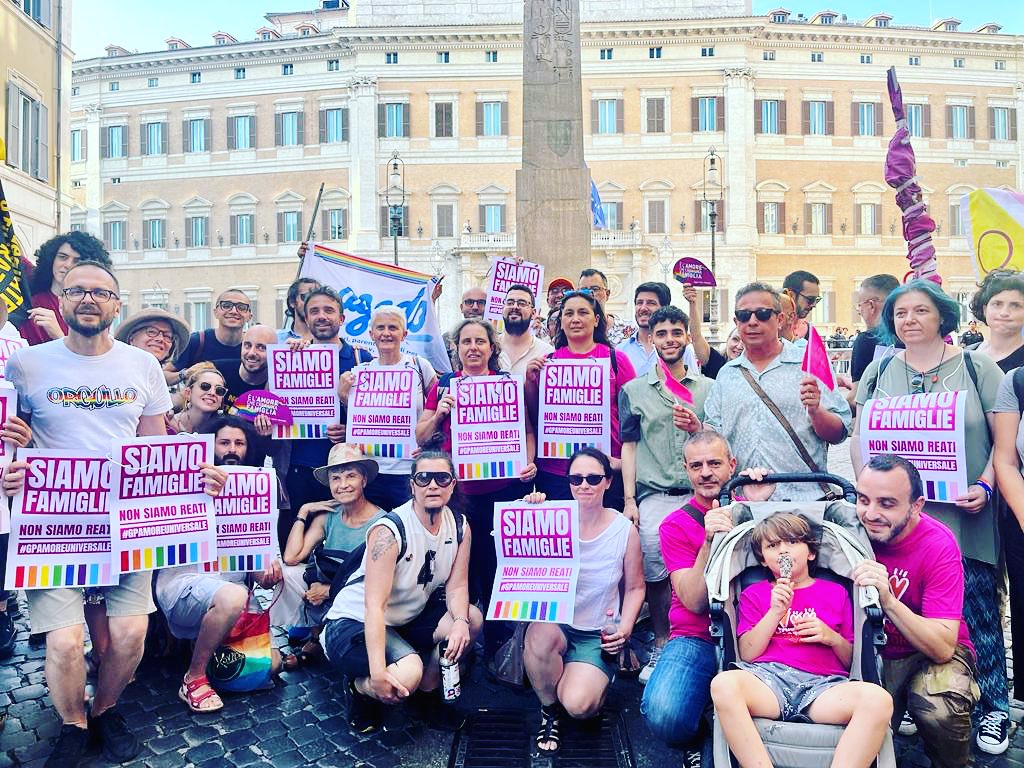
But in recent months, Italy’s right-wing government has been cracking down on city councils to stop listing same-sex parents on birth certificates, France 24 reported. Led by the hardline traditionalist Meloni, the ministry of interior issued a directive in January 2023 instructing Italian mayors to stop automatically registering the births of children conceived or born abroad through assisted reproductive methods.
It cited a case from December 2022, in which Italy’s top court ruled that a child of a gay couple who was conceived through surrogacy abroad shouldn’t have their birth certificate automatically transcribed in Italy.
Though the directive primarily concerned surrogacy, which is banned in Italy and now even a crime for those seeking surrogacy abroad, its interpretation by local councils has disproportionally affected LGBTQ families — including those who resort to other reproductive methods.
Italy’s Family Minister Eugenia Roccella told Italian newspaper Corriere della Serra: “In Italy, one becomes a parent in only two ways — either by biological relationship or by adoption,” and urged same-sex parents to follow the adoption procedure.
Currently the support for LGBTQ families on this issue is being provided by the LGBTQ rights organization, Famiglie Arcobaleno working alongside Rete Lenford, which is committed to advocacy for LGBTQ rights as an association of lawyers, lawyers, practitioners, scholars, students and people with experience in the issues surrounding LGBTQ rights.
Both Rete Lenford and Famiglie Arcobaleno, are representing hundreds of cases of the affected LGBTQ families in court.
Russia
(The following article is from Human Rights Watch)
Last week the European Court of Human Rights handed down a ruling in the case of Maxim Lapunov, the only victim of Chechnya’s vile 2017 anti-gay purge who dared seek justice for the torture he suffered at the hands of local law enforcement.
The court found Lapunov was “detained and subjected to ill-treatment by State agents,” which “amounted to torture” and was perpetrated “solely on account of his sexual orientation.”
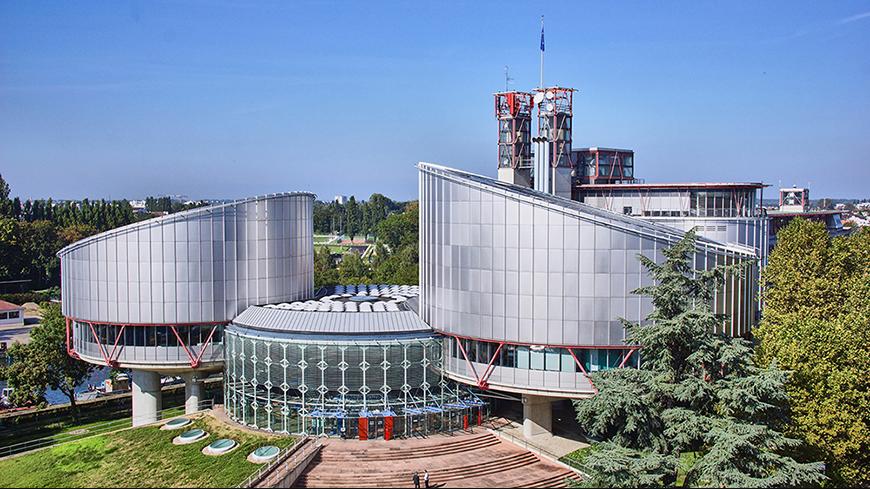
Lapunov took his case to the European Court in May 2019 because the Russian authorities had failed to investigate his assault. Despite great personal risk, Lapunov had been eager to cooperate with Russia’s investigative authorities through the assistance of his persistent lawyers from the Committee Against Torture, a leading Russian human rights group.
Tanya Lokshina, the associate director, Europe and Central Asia Division for Human Rights Watch noted:
“I first met Lapunov nearly six years ago, when I moderated a news conference in Moscow at which he publicly told his story for the first time. Lapunov, then 30, described to a roomful of journalists how he had been rounded up and tortured along with dozens of others. His hands shook as he detailed the horrific experience. He stopped several times to regain composure but kept going.”
A Russian from Siberia who had traveled to Chechnya for work, Lapunov did not have to face what every Chechen man caught in the purge feared: Being targeted by his own relatives or exposing his entire family to overwhelming stigma because of his homosexuality. His captors threatened to kill him if he spoke out, but he refused to be silent. “We all have rights …,” he said at the news conference. “If we just let it be [in Chechnya], … we’ll never know whose son or daughter will be taken next.”
At the time, Russian authorities claimed they could not investigate the purge because no victims stepped up to testify. When Lapunov provided his staggering testimony, they still failed to investigate. In early 2019, Chechen police rounded up and tortured more men because of their presumed sexual orientation. Realizing they would never get the Russian authorities to do their job and investigate, Lapunov and his legal team filed their complaint with the European Court of Human Rights. Today, they won.
After Russia’s full-scale invasion of Ukraine, Russia lost its Council of Europe membership and there is no hope that the Russian authorities will implement this ruling anytime soon. Yet it sets the record straight. This, I hope, will serve to support all survivors of the purge.
Additional reporting from PinkNewsUK, BBC, Agence France-Presse, GCN Ireland, the Irish Times and Human Rights Watch.
Israel
Activist recalls experience in Tel Aviv after Israel-Iran war began
Marty Rouse was part of Jewish Federations of North America Pride mission

A long-time activist who was in Israel last month when its war with Iran began has returned to D.C.
Marty Rouse traveled to Israel on June 6 with the Jewish Federations of North America. The 5-day mission ended the night before the annual Tel Aviv Pride parade was scheduled to take place.
Mission participants met with Israeli President Isaac Herzog and several LGBTQ activists in Tel Aviv and Jerusalem. They visited the Western Wall, the Nova Music Festival site, and Nir Oz, a kibbutz in southern Israel that is less than a mile from the country’s border with the Gaza Strip. Mission participants also visited Sderot, a city that is roughly a mile from the Hamas-controlled enclave, a veterans rehabilitation facility, a new LGBTQ health center and the Aguda: The Association for LGBTQ Equality in Israel in Tel Aviv.
Hamas militants on Oct. 7, 2023, killed upwards of 360 partygoers and kidnapped dozens more at the music festival that was taking place at a campground near Re’im, a kibbutz that is roughly 10 miles southwest of Nir Oz. The militants killed or took hostage nearly a quarter of Nir Oz’s residents. They also took control of Sderot’s police station.

Tel Aviv Deputy Mayor Chen Arieli spoke at the mission’s closing party that took place at the Sheraton Grand, a hotel that overlooks Tel Aviv’s beachfront, on June 12.
Rouse and other mission participants planned to stay in Tel Aviv for the Pride parade, which was scheduled to take place the following day. He and Gordie Nathan, another mission participant who lives in Palm Springs, Calif., had checked into a nearby hotel that was less expensive.
“We said our farewells,” recalled Rouse when he spoke with the Washington Blade in D.C. on June 24. “We went to our hotels, and we get the warning, and then all hell broke loose.”
Israel early on June 13 launched airstrikes against Iran that targeted the country’s nuclear and military facilities.
Rouse said mission organizers told him and other participants who remained in Tel Aviv to meet at the Sheraton Grand for breakfast and dinner — Israel’s airspace was closed in anticipation of an Iranian counterattack, and authorities cancelled the Pride parade.
He said he went to bomb shelters at least twice a night for three nights.
Israel’s Home Front Command during the war typically issued warnings about 10 minutes ahead of an anticipated Iranian missile attack. Sirens then sounded 90 seconds before an expected strike.
Rouse and Nathan walked to the Sheraton Grand on June 13 when the Home Front Command issued a 10-minute warning. They reached the hotel in a couple of minutes, and staff directed them to the bomb shelter.
“You know to walk slowly, everything’s fine,” recalled Rouse. “You get 10 minutes, so everything was fine when the alarm goes off.”
Rouse described the Sheraton Grand shelter as “well lit” with WiFi, a television, and air conditioning. He was watching an Israeli television station’s live coverage of the Iranian missile attack when he saw one hit an apartment building in the Tel Aviv suburb of Ramat Gan.
A 74-year-old woman died and her boyfriend was seriously injured.
“I go over to look at the TV, just to watch,” recalled Rouse. “All of a sudden, you watch, and you see one bomb go and land and explode in Tel Aviv on TV. It landed and blew up.”
“I was like, okay, this is real, and so that was scary,” he added.
Rouse said the bomb shelter in the hotel where he and Nathan were staying after the mission ended was far less comfortable.
“It was dark. It was humid. It was hot. It was very uncomfortable,” said Rouse. “You really felt alone.”

Rouse and nearly everyone else on the mission who were in Tel Aviv when the war began left Israel on June 15. They boarded buses that took them to the Jordanian capital of Amman, which is a roughly 2 1/2-hour drive from Tel Aviv through the West Bank.
Rouse described the trip as “like a field trip” until they drove across the Jordan River and arrived at the Jordanian border crossing.
“You walk into this room, and instead of being in a well air-conditioned airport, you’re in this hot, humid, small place in the middle of the desert, packed with people, and those big, large, loud fans and pictures of military people on the walls,” he said. “It was almost like a Casablanca kind of feeling.”
Rouse said Jordanian authorities brought mission participants through customs in groups of 10. A Jewish Federations of North America liaison from Amman who previously worked as a tour guide for A Wider Bridge — a group that “advocates for justice, counters LGBTQphobia, and fights antisemitism and other forms of hatred” — went “behind closed doors” to ensure everyone was able to enter the country.
“It took a really long time,” Rouse told the Blade.

Mission participants arrived in Amman a short time later. They checked into their hotel and then had dinner at a restaurant.
“Now we feel like we’re safe and we’re in Amman,” recalled Rouse. “We’re sitting outside having a beautiful dinner.”
Iranian missiles passed over Amman shortly after Rouse and the other mission participants had begun to eat their dessert. They went inside the restaurant, and waited a few minutes before they boarded busses that brought them back to their hotel.
“No one was openly freaking out, which I was surprised by,” said Rouse.
The group was scheduled to fly from Amman to Cairo at 11 p.m. local time (4 p.m. ET) on June 16. They visited Jerash, an ancient city north of Amman, before their flight left Jordan.
“[The Jerash trip] actually took our minds off of everything,” said Rouse.
A Jewish Federations of North America contact met Rouse and the other mission participants at Cairo’s airport once their flight landed. Rouse arrived at JFK Airport in New York on June 17.
Trump-announced ceasefire ended 12-day war
President Donald Trump on June 23 announced a ceasefire that ended the 12-day war.
The U.S. three days earlier launched airstrikes that struck three Iranian nuclear sites. The ceasefire took effect hours after Iran launched missiles at a U.S. military base in Qatar.
Iran said the war killed more than 900 people in the country.
The Associated Press notes Iranian missiles killed 28 people in Israel. One of them destroyed Tel Aviv’s last gay bar on June 16.
The war took place less than two years after Oct. 7.
The Israeli government says Hamas militants on Oct. 7, 2023, killed roughly 1,200 people on that day when it launched its surprise attack on the country. The militants also kidnapped more than 200 people.
The Hamas-controlled Gaza Health Ministry says Israeli forces have killed nearly 55,000 people in the enclave since Oct. 7. Karim Khan, the International Criminal Court’s chief prosecutor, has said Israeli Prime Minister Benjamin Netanyahu and former Hamas leader Yahya Sinwar, who the IDF killed last October, are among those who have committed war crimes and crimes against humanity in Gaza and Israel.

Rouse upon his return to the U.S. said he “was never as aware of the comfort of another human being than I was during that time.” Rouse affectionately called Nathan his “bomb shelter boyfriend” and even questioned the way he reacted to the missile alerts.
“He’s sitting on the edge of the bed and he goes, okay, I’m going to put on my socks and my shoes, and I say, really? You’re going to put on your socks,” Rouse told the Blade. “The fact that I was nervous, that putting on socks might have changed the direction of our lives, to me was like I can’t believe I said that to him.”
Rouse quickly added Nathan helped him remain calm.
“If I was by myself, those nights would have been long enough,” said Rouse. “It’s a totally different feeling to be with another human that you know than to be by yourself.”

Rouse also praised the Jewish Federations of North America.
“JFNA really sprung into action and started to figure out all options to get us all safely home,” said Rouse. “It was all about logistics. Staff worked around the clock identifying and then mobilizing to get us back to the states. It was a great team effort and I know I speak for everyone in expressing our deep appreciation for their dedication to getting us safely home.”
Latin America
Protests, demands for rights define Pride month in Latin America
More than 3 million people participated in São Paulo march

Activists across Latin America marked Pride month with massive demonstrations, cultural activities, and demands that their countries guarantee equality and protect LGBTQ people from violence.
From Santiago, Chile, to Mexico City, activists took to the streets to celebrate the rights that have been won and the many that are still pending.
Chile
The Pride march that the Movement for Homosexual Integration and Liberation (Movilh) and Fundación Iguales organized took place in downtown Santiago, the country’s capital, on June 22. Authorities and the two organizations say more than 120,000 people participated.
Under the slogan “Pride with memory and hope,” marchers demanded lawmakers approve a bill that would allow reparations for LGBTQ Chileans who Gen. Augusto Pinochet’s dictatorship targeted. There were also calls for the government to promote an LGBTQ-inclusive educational reform.
“This time we are marching on high alert,” said Movilh spokesperson Javiera Zúñiga. “For the first time in decades, we are losing achieved rights. We demand the state wake up. The reform of the Zamudio Law has been stalled for 13 years.”
Marches also took place in Valparaíso, Antofagasta, Temuco, and Concepción, highlighting the growing visibility of transgender groups and feminist organizations.
Mexico
Mexico City on June 29 was the epicenter of one of the region’s largest Pride marches.
More than 300,000 people participated in the march. Comité IncluyeT organized the 46th annual march under the slogan “Not one step back: rights are respected.”
Several organizations denounced the increase in hate crimes — Mexico’s National Observatory of Hate Crimes notes more than 80 LGBTQ people have been reported murdered in the last year. They also urged Mexican lawmakers to criminalize transfeminicides across the country.
Argentina
Although Buenos Aires’s official Pride march takes place in November, the Argentine LGBT+ Federation and other groups in the Argentine capital and in other cities across the country in June organized activities.
More than 5,000 people on June 24 marched from Plaza de Mayo to the Argentine Congress to reject the government’s dismantling of public policies. President Javier Milei’s decision to eliminate the country’s Women, Gender, and Diversity Ministry and cut sexual health programs were among the moves the protesters denounced.
“Today Pride is also resistance to the adjustment,” pointed out Comunidad Homosexual Argentina, an LGBTQ advocacy group.

Colombia
Thousands of people in Bogotá, the Colombian capital, and the cities of Medellín, Cali, and Barranquilla marched on June 29.
The marchers’ slogan was “diversity is also peace,” in a context where violence against LGBTQ people remains high. Caribe Afirmativo, a Colombian LGBTQ rights group, notes more than 45 people from the community has been reported killed in the country over the last 12 months, with most of them trans women.
Organizations also demanded lawmakers resume debate of a bill that would extend comprehensive protections to LGBTQ Colombians. The measure has been stalled in Congress since 2023.
Brazil
More than 3 million people participated in the 28th São Paulo LGBTQ+ Pride Parade that took place on the city’s Paulista Avenue on June 22.
The parade took place under the slogan “LGBT+ social policies: we want the whole thing, not half of it.” Organizers demanded expanded access to health care, employment, and education for the most vulnerable communities, especially Black trans people. They also denounced ultraconservative figures who seek to curtail LGBTQ rights.
Peru and Paraguay
More than 15,000 people took part in a Pride march in Lima, the Peruvian capital, on June 28. Participants demanded lawmakers approve a trans rights law, which has been stalled in the Peruvian Congress since 2016, and recognition of civil unions.
Members of SomosGay, a Paraguayan LGBTQ rights group, and other organizations participated in a Pride march that took place in Asunción, the country’s capital, on June 29.
The march took place without incident, despite threats and anti-LGBTQ hate speech on social media. Participants demanded an end to anti-LGBTQ discrimination and rhetoric from social and religious groups.
Central America
Upwards of 2,000 people participated in a Pride march in Tegucigalpa, the Honduran capital, on June 22. A Pride demonstration took place in San Salvador, the capital of neighboring El Salvador, on June 28.
India
Anaya Bangar challenges ban on trans women in female cricket teams
Former Indian cricketer Sanjay Bangar’s daughter has received support

Anaya Bangar, the daughter of former Indian cricketer Sanjay Bangar, has partnered with the Manchester Metropolitan University Institute of Sport in the U.K. to assess her physiological profile following her gender-affirming surgery and undergoing hormone replacement therapy.
From January to March 2025, the 23-year-old underwent an eight-week research project that measured her glucose levels, oxygen uptake, muscle mass, strength, and endurance after extensive training.
The results, shared via Instagram, revealed her metrics align with those of cisgender female athletes, positioning her as eligible for women’s cricket under current scientific standards. Bangar’s findings challenge the International Cricket Council’s 2023 ban on transgender athletes in women’s cricket, prompting her to call for a science-based dialogue with the Board of Control for Cricket in India and the ICC to reform policies for trans inclusion.
“I am talking with scientific evidence in my hand,” Bangar said in an interview posted to her Instagram page. “So, I hope, this makes an impact and I will be hoping to BCCI and ICC talking with me and discussing this further.”
On Nov. 21, 2023, the ICC enacted a controversial policy barring trans women from international women’s cricket. Finalized after a board meeting in Ahmedabad, India, the regulation prohibits any trans player who has experienced male puberty from competing, irrespective of gender-affirming surgery or hormone therapy. Developed through a 9-month consultation led by the ICC’s Medical Advisory Committee, the rule aims to safeguard the “integrity, safety, and fairness” of women’s cricket but has drawn criticism for excluding athletes like Canada’s Danielle McGahey, the first trans woman to play internationally. The policy, which allows domestic boards to set their own rules, is slated for review by November 2025.
Bangar shared a document on social media verifying her participation in a physiological study at the Manchester Metropolitan University Institute of Sport, conducted from Jan. 20 to March 3, 2025, focused on cricket performance. The report confirmed that her vital metrics — including hemoglobin, blood glucose, peak power, and mean power — aligned with those of cisgender female athletes. Initially, her fasting blood glucose measured 6.1 mmol/L, slightly above the typical non-diabetic range of 4.0–5.9 mmol/L, but subsequent tests showed it normalized, reinforcing the study’s findings that her physical profile meets female athletic standards.
“I am submitting this to the BCCI and ICC, with full transparency and hope,” said Bangar. “My only intention is to start a conversation based on facts not fear. To build space, not divide it.”
In a letter to the BCCI and the ICC, Bangar emphasized her test results from the Manchester Metropolitan University study. She explained that the research aimed to assess how hormone therapy had influenced her strength, stamina, hemoglobin, glucose levels, and overall performance, benchmarked directly against cisgender female athletic standards.
Bangar’s letter to the BCCI and the ICC clarified the Manchester study was not intended as a political statement but as a catalyst for a science-driven dialogue on fairness and inclusion in cricket. She emphasized the importance of prioritizing empirical data over assumptions to shape equitable policies for trans athletes in the sport.
Bangar urged the BCCI, the world’s most influential cricket authority, to initiate a formal dialogue on trans women’s inclusion in women’s cricket, rooted in medical science, performance metrics, and ethical fairness. She called for the exploration of eligibility pathways based on sport-specific criteria, such as hemoglobin thresholds, testosterone suppression timelines, and standardized performance testing. Additionally, she advocated for collaboration with experts, athletes, and legal advisors to develop policies that balance inclusivity with competitive integrity.
“I am releasing my report and story publicly not for sympathy, but for truth. Because inclusion does not mean ignoring fairness, it means measuring it, transparently and responsibly,” said Bangar in a letter to the BCCI. “I would deeply appreciate the opportunity to meet with you or a representative of the BCCI or ICC to present my findings, discuss possible policy pathways, and work towards a future where every athlete is evaluated based on real data, not outdated perceptions.”
Before her transition, Bangar competed for Islam Gymkhana in Mumbai and Hinckley Cricket Club in the U.K., showcasing her talent in domestic cricket circuits. Her father, Sanjay Bangar, was a dependable all-rounder for the Indian national cricket team from 2001 to 2004, playing 12 test matches and 15 One Day Internationals. He later served as a batting coach for the Indian team from 2014 to 2019, contributing to its strategic development.
Cricket in India is a cultural phenomenon, commanding a fanbase of more than 1 billion, with more than 80 percent of global cricket viewership originating from the country.
The International Cricket Council, the sport’s governing body, oversees 12 full member nations and more than 90 associate members, with the U.S. recently gaining associate member status in 2019 and co-hosting the 2024 ICC Men’s T20 World Cup. The BCCI generated approximately $2.25 billion in revenue in the 2023–24 financial year, primarily from the Indian Premier League, bilateral series, and ICC revenue sharing. The ICC earns over $3 billion from media rights in India alone for the 2024–27 cycle, contributing nearly 90 percent of its global media rights revenue, with the BCCI receiving 38.5 percent of the ICC’s annual earnings, approximately $231 million per year.
Women’s cricket in India enjoys a growing fanbase, with over 300 million viewers for the Women’s Premier League in 2024, making it a significant driver of the sport’s global popularity. The International Cricket Council oversees women’s cricket in 12 full member nations and over 90 associate members, with the U.S. fielding a women’s team since gaining associate status in 2019 and competing in ICC events like the 2024 Women’s T20 World Cup qualifiers. The BCCI invests heavily in women’s cricket, allocating approximately $60 million annually to the WPL and domestic programs in 2024–25, while contributing to the ICC’s $20 million budget for women’s cricket development globally. India’s media market for women’s cricket, including WPL broadcasting rights, generated $120 million in 2024, accounting for over 50 percent of the ICC’s women’s cricket media revenue.
“As a woman, I feel when someone says that they are women, then they are, be trans or cis. A trans woman is definitely the same as a cis woman emotionally and in vitals, and specially, when someone is on hormone replacement therapy. Stopping Anaya Bangar from playing is discrimination and violation of her rights. It is really sad and painful that every trans woman need to fight and prove their identity everywhere,” said Indrani Chakraborty, an LGBTQ rights activist and a mother of a trans woman. “If ICC and BCCI is stopping her from playing for being transgender, then I will say this to be their lack of awareness and of course the social mindsets which deny acceptance.”
Chakraborty told the Blade that Bangar is an asset, no matter what. She said that the women’s cricket team will only benefit by participation, but the discriminating policies are the hindrance.
“Actually the transgender community face such discrimination in every sphere. In spite of being potent, they face rejection. This is highly inhuman. These attitudes is regressive and will never let to prosper. Are we really in 2025?,” said Chakraborty. “We, our mindset and the society are the issues. We, as a whole, need to get aware and have to come together for getting justice for Anaya. If today, we remain silent, the entire community will be oppressed. Proper knowledge of gender issues need to be understood.”
The BCCI and the International Cricket Council have not responded to the Blade’s repeated requests for comment.
-

 U.S. Supreme Court3 days ago
U.S. Supreme Court3 days agoSupreme Court to consider bans on trans athletes in school sports
-

 Out & About3 days ago
Out & About3 days agoCelebrate the Fourth of July the gay way!
-

 Virginia3 days ago
Virginia3 days agoVa. court allows conversion therapy despite law banning it
-

 Maryland5 days ago
Maryland5 days agoLGBTQ suicide prevention hotline option is going away. Here’s where else to go in Md.





